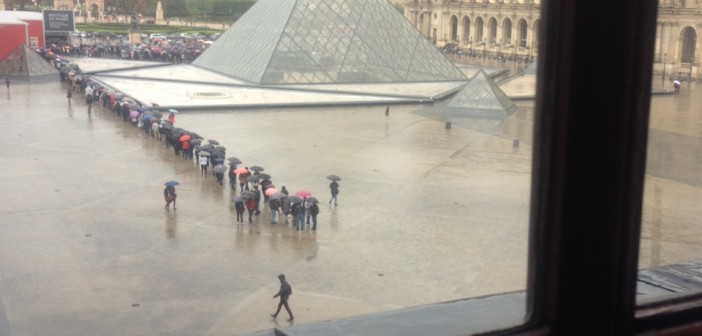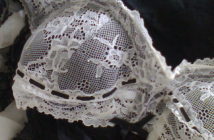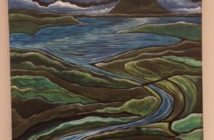Your Te Puna Correspondent is tired but happy to be in the middle of Paris, at the Louvre in fact. This enormous, enormous display space for the culture of Europe as gathered by the majesties of France (as well as one or two succeeding emperors) was nearly, but not quite, overwhelming after a 13-hour, near-sleepless (read: actually sleepless for me, but others managed to) flight from Singapore.
The TPC drew on all her energy reserves to make the most of an allocated three-hour stint among far too many great works of art, far too much grand architecture, and far too many visitors, for her poor senses to take in properly. The vastness and power of this palace has to be experienced, not described. That said, she had the advantage of stumbling upon a work in progress, Une Breve Historie de l’Avenir, which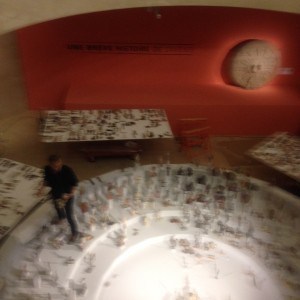 displays – or, it seems, will display, in concentric circles of course, how M. Attali foresees, in his history of the future, a composition of hyperdemocracy. In the Louvre – the least democratic of built structures – a high sense of irony may perhaps be forgiven, but to produce this extremely imminent exhibition (it opens on 24 September 2015) under the interested – or not – gaze of the public
displays – or, it seems, will display, in concentric circles of course, how M. Attali foresees, in his history of the future, a composition of hyperdemocracy. In the Louvre – the least democratic of built structures – a high sense of irony may perhaps be forgiven, but to produce this extremely imminent exhibition (it opens on 24 September 2015) under the interested – or not – gaze of the public 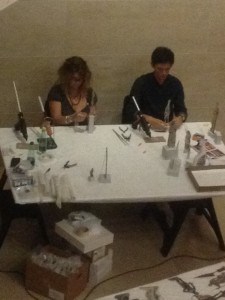 does present, also, a magnificent metaphor: we can see, as present observers, a view of things yet to come. What lies in wait for the present observer within the Louvre itself is, well, quite a long wait, at least for some things. The TPC was quite sure that there must be some sort of Very Special Show on in the courtyard, judging by the queue, but
does present, also, a magnificent metaphor: we can see, as present observers, a view of things yet to come. What lies in wait for the present observer within the Louvre itself is, well, quite a long wait, at least for some things. The TPC was quite sure that there must be some sort of Very Special Show on in the courtyard, judging by the queue, but 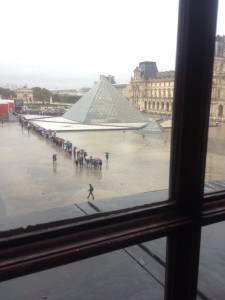 it turned out to be the way one went about purchasing an indelible memory from the museum’s shop. But there were some corners of this wondrous place that were quite deserted, and no
it turned out to be the way one went about purchasing an indelible memory from the museum’s shop. But there were some corners of this wondrous place that were quite deserted, and no 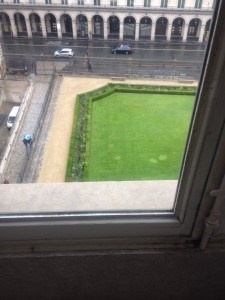 doubt highly valued for that quality by the monarchs who led such public lives for most of their life. “What,” your correspondent’s companion wondered aloud, “would those kings and queens think about these throngs milling around in their rooms and corridors?” Well, in my view they would hardly even notice, because the place was clearly built to take a crowd, and if they did notice, it would be for the limited purposes of ensuring we all knew our place – even in its present status as a place for everyone, some arm still has to do the cleaning and tidying and dusting. A task currently made more demanding by the renovations being undertaken, inserting into the old stone spaces amenities like modern loos ( the TPC used one that looked like it came in in the 1920s, although the porcelain was made by Limoges) and lifts. This visit was less to do with art itself as it was with the experience of art, in high volumes and under considerable time pressure. Our wandering gaze could not settle for long on any one work. This was, literally, a look around, taking in less of the individual qualities of the works than the overall realisation of their cumulative effect. It’s maybe banal to point out that each one of the thousands on display had absorbed hours and hours of highly skilled human endeavour and had each been – from the Winged Victory of Samothrace to the known and unknown subjects of the many, many portraits – a point of focus for significant amounts of time in the lives of their creator and eventual owner. But when you start to add it all up, the museum becomes exactly the reservoir of hyperdemocracy that Attali discusses: an aggregate of collective intelligence whose overall result is much different from what individuals wanted. Only in an institution on the scale of the Louvre can you begin to see what he’s on about. Locating an exhibition reflecting a history of the future here is therefore not an exercise in irony: it is necessary.
doubt highly valued for that quality by the monarchs who led such public lives for most of their life. “What,” your correspondent’s companion wondered aloud, “would those kings and queens think about these throngs milling around in their rooms and corridors?” Well, in my view they would hardly even notice, because the place was clearly built to take a crowd, and if they did notice, it would be for the limited purposes of ensuring we all knew our place – even in its present status as a place for everyone, some arm still has to do the cleaning and tidying and dusting. A task currently made more demanding by the renovations being undertaken, inserting into the old stone spaces amenities like modern loos ( the TPC used one that looked like it came in in the 1920s, although the porcelain was made by Limoges) and lifts. This visit was less to do with art itself as it was with the experience of art, in high volumes and under considerable time pressure. Our wandering gaze could not settle for long on any one work. This was, literally, a look around, taking in less of the individual qualities of the works than the overall realisation of their cumulative effect. It’s maybe banal to point out that each one of the thousands on display had absorbed hours and hours of highly skilled human endeavour and had each been – from the Winged Victory of Samothrace to the known and unknown subjects of the many, many portraits – a point of focus for significant amounts of time in the lives of their creator and eventual owner. But when you start to add it all up, the museum becomes exactly the reservoir of hyperdemocracy that Attali discusses: an aggregate of collective intelligence whose overall result is much different from what individuals wanted. Only in an institution on the scale of the Louvre can you begin to see what he’s on about. Locating an exhibition reflecting a history of the future here is therefore not an exercise in irony: it is necessary.
The Te Puna Correspondent. The Te Puna Correspondent is a rurally living, culturally eclectice contributor for Tauranga and the Bay of Plenty.


